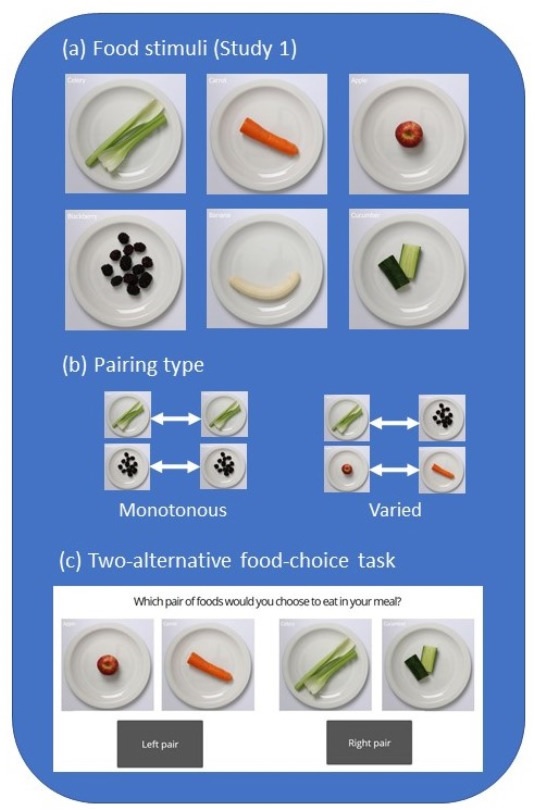Summary Many reports show that non-human animals have the ability to select foods based on their micronutrient composition. However, it is not clear whether humans also have this ability, and we lacked appropriate methods to investigate this question. In response to this challenge, we developed an approach that derives evidence of patterns of choices across a variety of food images. In two studies (Study 1, N=45; Study 2, N=83), adults selected one of two pairs of fruits and vegetables in a series of trials (N=210). Consistent with variety seeking, they preferred “varied” pairs to “monotonous” pairs (same-food pairs were less attractive). However, and even after controlling for explicit nutritional knowledge (Study 2) and energy density of foods (Study 1 and 2), we observed a significant tendency to select combinations that offered: i) a higher total intake of micronutrients and ii ) greater "micronutrient complementarity." (MC), that is, a broader range of micronutrients. In a separate analysis, a similar pattern was observed in two-component meals (e.g., steak and chips) drawn from a large national nutrition survey in the United Kingdom (1086 records). Specifically, the MC of these meals was higher than would be predicted by chance (p<.0001) and when a meal provided excess micronutrients (>100% of the recommended daily allowance), this occurred less frequently than by chance (p<. 0001), that is, ’micronutrient redundancy’ was avoided. Together, these works provide new evidence that micronutrient composition influences food choice (a form of "nutritional wisdom" ) and raises questions about whether nutritional requirements are otherwise met through "variety seeking." in the diet. In turn, it also exposes the potential for previously unrecognized complexity in human dietary decision-making. |

Illustration of the paradigm for Study 1. Participants were shown 6 different foods (a), which were combined with other foods to generate six types of monotonic pairs and 15 types of varied pairs (b). In a two-alternative forced-choice task, each pair (N = 21) was presented alongside every other pair in a series of 210 trials (c). Participants responded by selecting ’left pair’ or ’right pair’ using a computer mouse.
Comments
Pioneering research has shed new light on what drives people’s basic food preferences, indicating that our choices may be smarter than previously thought and influenced by the specific nutrients we need, rather than just the calories.
The international study, led by the University of Bristol, UK, set out to re-examine and test the widely held view that humans evolved to favor energy-dense foods and our diets are balanced simply by eating a variety of different foods. Contrary to this belief, their findings revealed that people appear to have "nutritional wisdom ," so foods are selected in part to meet our need for vitamins and minerals and avoid nutritional deficiencies.
Lead author Jeff Brunstrom, professor of Experimental Psychology, said: “The results of our studies are enormously significant and quite surprising. “For the first time in almost a century, we have shown that humans are more sophisticated in their food choices and appear to select based on specific micronutrients rather than simply eating everything and getting what they need by default.”
The article, published in the journal Appetite, gives new weight to the bold research conducted in the 1930s by an American pediatrician, Dr. Clara Davis, who put a group of 15 babies on a diet that allowed them to "self-select "In other words, they ate whatever they wanted, from 33 different foods. Although no child ate the same combination of foods, they all achieved and maintained good health, which was taken as evidence of “nutritional wisdom . ”
His findings were later examined and criticized, but it was not possible to replicate Davis’s research because this form of experimentation on infants would today be considered unethical. As a result, it has been almost a century since any scientist attempted to find evidence of nutritional wisdom in humans, a faculty that has also been found in other animals, such as sheep and rodents.
To overcome these barriers, Professor Brunstrom’s team developed a novel technique that involved measuring preference by showing people images of different combinations of fruits and vegetables so that their choices could be analyzed without putting their health or well-being at risk.
In total, 128 adults participated in two experiments. The first study showed that people prefer certain food combinations more than others. For example, apple and banana may be chosen a little more often than apple and blackberries. Surprisingly, these preferences appear to be predicted by the amounts of micronutrients in a pair and whether their combination provides a balance of different micronutrients. To confirm this, they conducted a second experiment with different foods and ruled out other explanations.
To complement and collate these findings, real-world food combinations as reported in the UK National Diet and Nutrition Survey were studied. Similarly, these data showed that people combine meals in a way that increases exposure to micronutrients in their diet. Specifically, components of popular UK meals, for example "fish and chips" or "curry and rice", appear to offer a wider range of micronutrients than randomly generated food combinations, such as "chips and curry". ".
The study is also notable as it features an unusual collaboration. Professor Brunstrom’s co-author is Mark Schatzker, a journalist and author, who is also writer-in-residence at the Modern Physiology and Diet Research Center, affiliated with Yale University. In 2018, the two met in Florida at the annual meeting of the Society for the Study of Ingestive Behavior , where Schatzker gave a talk about his book, The Dorito Effect , which examines how the taste of whole foods and foods has changed. processed , and the implications for health and well-being. Interestingly, Professor Brunstrom and Mark Schatzker’s research originated from a disagreement.
Professor Brunstrom explained: “I saw Mark give a fascinating talk that challenged the received view among behavioral nutrition scientists that humans only look for calories in food. He noted, for example, that good wine, rare spices and wild mushrooms are highly sought after but are a poor source of calories.
“This was all very intriguing, so I went to see him at the end and basically said, ’Great talk, but I think you’re probably wrong. Do you want to try it? That marked the beginning of this wonderful journey, which ultimately suggests that he was wrong. “Far from being a somewhat naïve generalist, as previously believed, humans appear to possess a discerning intelligence when it comes to selecting a nutritious diet.”
Mark Schatzker added: “The research raises important questions, especially in the modern food environment. For example, does our cultural fixation with fad diets, which limit or prohibit the consumption of certain types of foods, disrupt or disrupt this dietary "intelligence" in ways we do not understand?
“Studies have shown that animals use taste as a guide to the vitamins and minerals they need. If flavor plays a similar role for humans, then we may be imbuing junk foods like chips and soda with a false "glow" of nutrition by adding flavorings. In other words, the food industry may be turning our nutritional wisdom against us , making us eat foods we would normally avoid and thus contributing to the obesity epidemic."
















